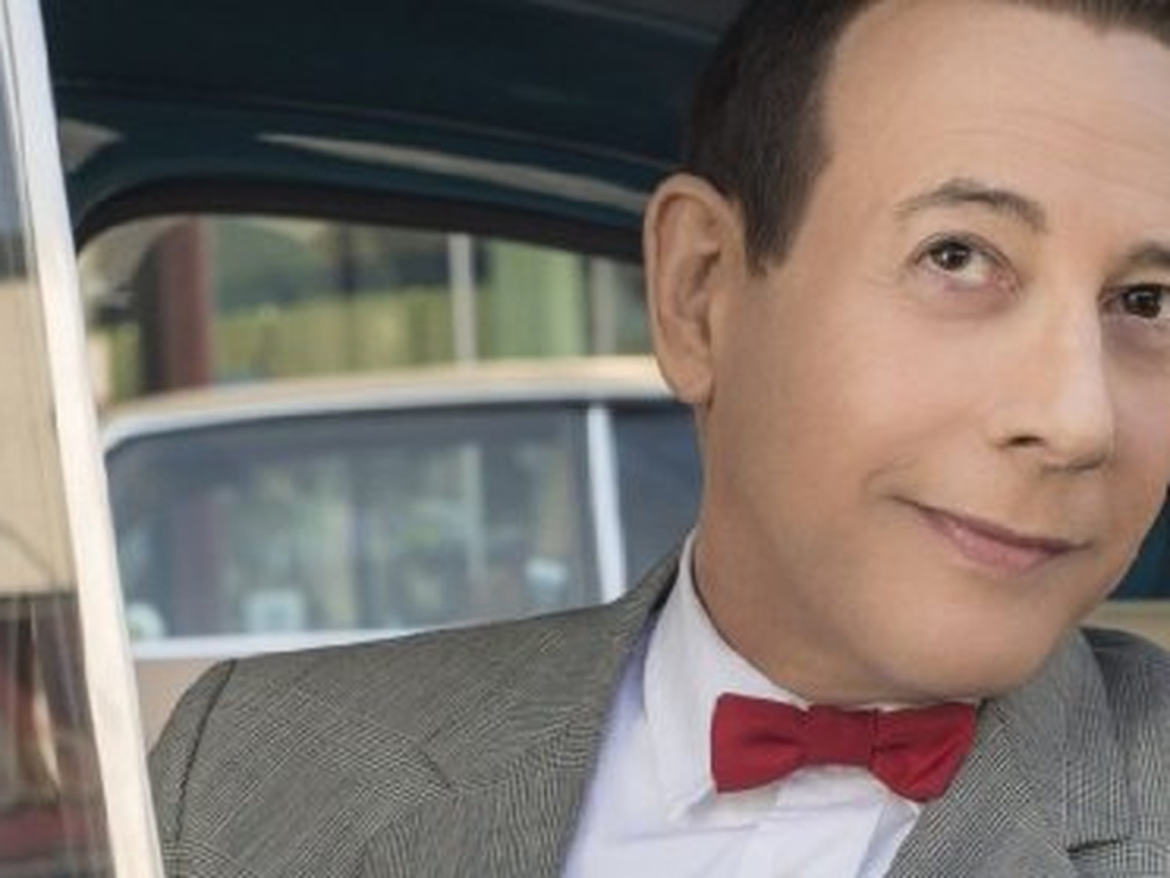For more than 40 years, the character entertained kids and adults alike with his cockeyed comedic sensibility.
Editor’s note, August 1, 2023: Paul Reubens died on July 30 of cancer. He was 70. Our story on Reubens’s most famous creation, Pee-wee Herman, originally published on March 19, 2016, follows.
Pee-wee Herman, created and embodied by Paul Reubens, came into the world in 1977, when Reubens was a member of the Groundlings comedy troupe. Reubens and Phil Hartman, a friend and fellow Groundlings performer (who died in 1998), conceived of the character together; Pee-wee was a hit with Groundlings audiences and soon became a regular on the Late Show With David Letterman and other talk shows. The character’s stage show, developed at the Groundlings Theatre, eventually moved to LA and was taped for an HBO special.
Pee-wee made his first onscreen appearance in 1980’s Cheech and Chong’s Next Movie; by 1985, Reubens had his first feature film, Pee-wee’s Big Adventure. That, in turn, spawned the kids’ show Pee-wee’s Playhouse, which aired Saturday mornings on CBS from 1986 to 1990.
Of course, it’s impossible to talk about Pee-wee or Reubens without mentioning the scandal that briefly derailed Reubens’s career and drove him out of the public eye for a time. In 1991, Reubens was arrested for masturbating in an adult movie theater in his hometown of Sarasota, Florida. News of the arrest — and a mug shot featuring the star with long hair and stubble, a deliberate departure from his natty onscreen persona that was made all the more disturbing by the context — quickly rounded the tabloids.
Though Reubens hadn’t appeared in character as Pee-wee for a year and a half at that point, CBS was still airing reruns of his show; once news of his arrest broke, CBS quickly pulled the reruns, causing many to mistakenly assume his show had been canceled because of the incident. Reubens was subjected to ridicule, and TV studios and merchandisers rushed to distance themselves from the Pee-wee character.
However, some of Reubens’s famous friends came to the actor’s defense, including Cyndi Lauper, who had sung the theme song for Pee-wee’s Playhouse (under the name Ellen Shaw), and — now rather cringe-inducingly — Bill Cosby, who at the time released a statement that read in part, “Whatever (Reubens has) done, this is being blown all out of proportion.”
Reubens may never fully escape the scandal, but he and the character of Pee-wee have managed to remain a regular presence in Hollywood nonetheless. Reubens has worked steadily (with a couple of breaks in the early ’90s) since the late 1970s on a wide variety of projects. He’s played roles in comedy favorites like 30 Rock, Tim and Eric Awesome Show, Great Job!, the short-lived Bryan Fuller series Pushing Daisies, and contemporary hits like The Blacklist and Gotham. He’s also done voice acting on a number of animated shows and brought his Pee-wee Herman Show to Broadway in 2010.
The character was a critical and box office success
/cdn.vox-cdn.com/uploads/chorus_asset/file/6215063/peeweehouse.0.png)
Pee-wee’s Playhouse
In creating Pee-wee, Reubens, in a somewhat genius stroke, figured out that the line between the world of late-night television and early morning children’s television was blurrier than most people realized — and thus, a specific kind of humor could appeal to both audiences. And his cockeyed comedic sensibility — “an unreasonable love of repetition, absurdity, narrative disjuncture and jokes that either last way too long or flit by in a short-attention-span-accommodating blink,” as the New York Times Magazine described it — fit the bill exactly.
His idea paid big dividends: Pee-wee’s Big Adventure (which marked director Tim Burton‘s feature film debut and was scored by Danny Elfman) was a bona fide box office success, grossing $40 million off its $6 million budget — the 19th-highest-grossing movie of its release year, 1985, ahead of other cult classics like Weird Science, The Black Cauldron, and The Sure Thing.
The subsequent TV series, Pee-wee’s Playhouse, became a hit precisely because of Pee-wee’s wide-ranging appeal. As Caseen Gaines recounts in the book Inside Pee-Wee’s Playhouse: The Untold, Unauthorized, and Unpredictable Story of a Pop Phenomenon:
An onslaught of positive press and word of mouth began to bring more adults to Saturday morning television. Although adults were not the target audience, and were considered worthless viewers as far as the advertisers were concerned, they were bringing their children, nieces, and nephews to the show. Within weeks, the show started climbing in the ratings, ultimately surpassing The Smurfs before the first season concluded.
Critics took notice as well; Pee-wee’s Playhouse won an impressive 15 Daytime Emmys during its four years on the air and was nominated for many more.
Reubens deliberately kept almost every aspect of Pee-wee ambiguous
As Reubens has said of his famous character, according to Wired’s great history: “To me, there was a conceptual aspect to Pee-wee. … If you thought Pee-wee was a kid, fine. If you thought Pee-wee was a man trying to be a kid, great. If you thought Pee-wee was developmentally challenged, fine, whatever.”
That character’s open-endedness is part of why Pee-wee’s Playhouse attracted so many disparate audiences; another aspect of his popularity is that Reubens championed a brand of weirdo inclusion that appealed to kids and adults alike.
/cdn.vox-cdn.com/uploads/chorus_asset/file/6215029/laurencef.png)
Screenshot via Youtube
This came through in the show’s cast — which featured more African American performers than many TV shows airing today (including future stars such as S. Epatha Merkerson and Laurence Fishburne) — as well as its conception of sexuality, which was always a bit murky and fluid. Pee-wee, after all, looked like a grown man, included plenty of sexual innuendo in his show, and in 1988’s Big Top Pee-wee shared an onscreen kiss of record-setting length with actress Valeria Golino. But he also cavorted around his house in bunny slippers and in the Pee-wee’s Playhouse episode “Pajama Party” decided he loved fruit salad so much he would marry it.
Judd Apatow, who produced Pee-wee’s Big Holiday for Netflix, aptly described the character’s appeal to the New York Times Magazine: ‘‘When I was younger, I didn’t put my finger on why I liked Pee-wee so much — it just made me laugh.” He continued:
But looking back, it’s a group of strange people who are having a great time and being really nice to each other, and as a slightly weird kid I must have understood that. I liked watching someone so different whom the audience loved. The idea that unique people were getting applause, that the crowd was going crazy for Pee-wee, made me feel you didn’t have to be the football-team quarterback.
Pee-wee’s Playhouse conveyed the feeling that differences large and small were not just accepted but appreciated; it’s not hard to see why it would strike kids as comforting and adults as groundbreaking.



